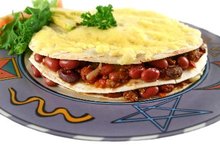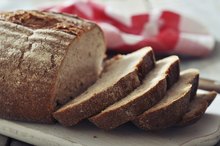Nutritional Facts for Oatcakes
The oatcake is a Scottish specialty that originated in Staffordshire. It is similar to a pancake, and is made using oatmeal, flour, water and yeast. However, unlike the pancake, the oatcake is usually topped with savory foods, such as cheese and bacon. Nutritionally, oatcakes, without their high-fat and sodium toppings, are low in sodium and a good source of fiber.
Calories
Calories in oatcakes vary depending on the size. An 8-inch oatcake contains 120 calories. By comparison, an 8-inch pancake contains about 160 calories. The oatcake is a low-energy dense food, meaning it has a low-calorie content compared to its serving size. Oatcakes can help you feel full on fewer calories, which can aid in weight control.
Carbohydrates
The Carbohydrates in Glazed Doughnuts
Learn More
As a flour-based food item, most of the calories in the oatcake come from carbohydrates. But these cakes are also a good source of fiber. One 8-inch oatcake contains 34 grams of carbohydrates and 3 grams of fiber. One cake meets 12 percent of your daily value for fiber. The percent daily value is a guide to help you make healthy food choices developed by the Food and Drug Administration, and is based on a 2,000-calorie diet for healthy adults. The fiber in the oatcake also helps with weight control by slowing digestion and improving satiety. The fiber also lowers blood cholesterol levels.
Protein and Fat
The oatcake is also low in fat and a good source of protein. One cake contains 4 grams of total fat, 1 gram of saturated fat and 7 grams of protein, meeting 6 percent of your daily value for total fat, 5 percent of your daily value for saturated fat and 14 percent of your daily value for protein. While the oatcake is a good source of protein, it does not provide all of the essential amino acids, making it an incomplete source of protein.
Sodium
Calories in Panini Bread
Learn More
The oatcake is also very low in sodium. One 8-inch cake contains 1 milligram of sodium. By comparison, the same size serving of pancakes contains up to 500 milligrams of sodium. Sodium is an essential nutrient, but most Americans consume twice their daily needs, according to the Colorado State University Extension. High intakes of sodium contribute to elevated blood pressures. Limit your daily intake to 1,500 to 2,300 milligrams a day.
Related Articles
References
- Oatcakes.org: What is an Oatcake?
- My Fitness Pal: Calories in North Staffs Oatcake
- Allotment Growing Recipes; Recipe for North Staffordshire Oatcake; John Harrison
- MayoClinic.com; Exchange List: Starches; May 2010
- MayoClinic.com; Energy Density and Weight Loss: Feel Full on Fewer Calories; January 2011
- MayoClinic.com; Percent Daily Value: What Does it Mean?; Katherine Zeratsky; May 2010
- MayoClinic.com; Dietary Fiber: Essential for a Healthy Diet; November
- "The Complete Book of Food Counts"; Corinne T. Netzer; 2009
Writer Bio
Jill Corleone is a registered dietitian and health coach who has been writing and lecturing on diet and health for more than 15 years. Her work has been featured on the Huffington Post, Diabetes Self-Management and in the book "Noninvasive Mechanical Ventilation," edited by John R. Bach, M.D. Corleone holds a Bachelor of Science in nutrition.









